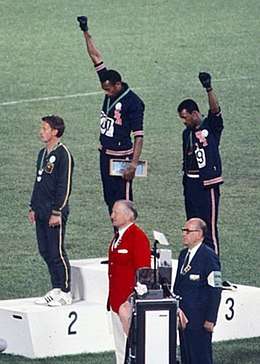Olympic Project for Human Rights
The Olympic Project for Human Rights (OPHR) was an American organization established by sociologist Harry Edwards and others, including noted Olympians Tommie Smith and John Carlos, in October 1967. The aim of the organization was to protest against racial segregation in the United States and elsewhere (such as South Africa), and racism in sports in general.[1]

Smith said that the project was about human rights, of "all humanity, even those who denied us ours."[2] Most members of the OPHR were African American athletes or community leaders.
Background
In the middle of the 20th century sports in the United States of America were used to try and imply that there was less institutional racism than there was. In an interview with Vox, Dexter Blackman, a professor of history at Morgan State University, states: "The media began to promote the black athlete as a symbol that racial democracy existed in the United States ... a factor that was used to dismiss the question of institutionalized racism". This was prevalent even prior to the formal abolition of legal segregation in the United States.[3]
Proposed Boycott of the 1968 Summer Olympics
The group advocated a boycott of the 1968 Summer Olympic Games in Mexico City unless four conditions were met:
- South Africa and Rhodesia uninvited from the Olympics (both countries were under white minority rule at the time).
- The restoration of Muhammad Ali's world heavyweight boxing title.
- Avery Brundage to step down as President of the International Olympic Committee.
- Hiring of more African-American assistant coaches.[1]
Black Power Salute
While the boycott largely failed to materialize, African-American sprinters Tommie Smith and John Carlos and Australian sprinter Peter Norman wore OPHR patches during the medal ceremony for the 200-metre race. Tommie Smith and John Carlos also raised their hands in a "Black Power salute" during the playing of the United States national anthem.
Despite being a primarily African-American organization, the OPHR was supported by white athletes such as Norman and members of the Harvard University rowing team.[1]
References
- "Resistance: the best Olympic spirit – International Socialism". Retrieved 2019-05-29.
- Silent Gesture - Autobiography of Tommie Smith (excerpt via Google Books) - Smith, Tommie & Steele, David, Temple University Press, 2007, ISBN 978-1-59213-639-1
- "The story behind this iconic Olympics protest". Youtube. Vox Media. Retrieved 2020-07-13.